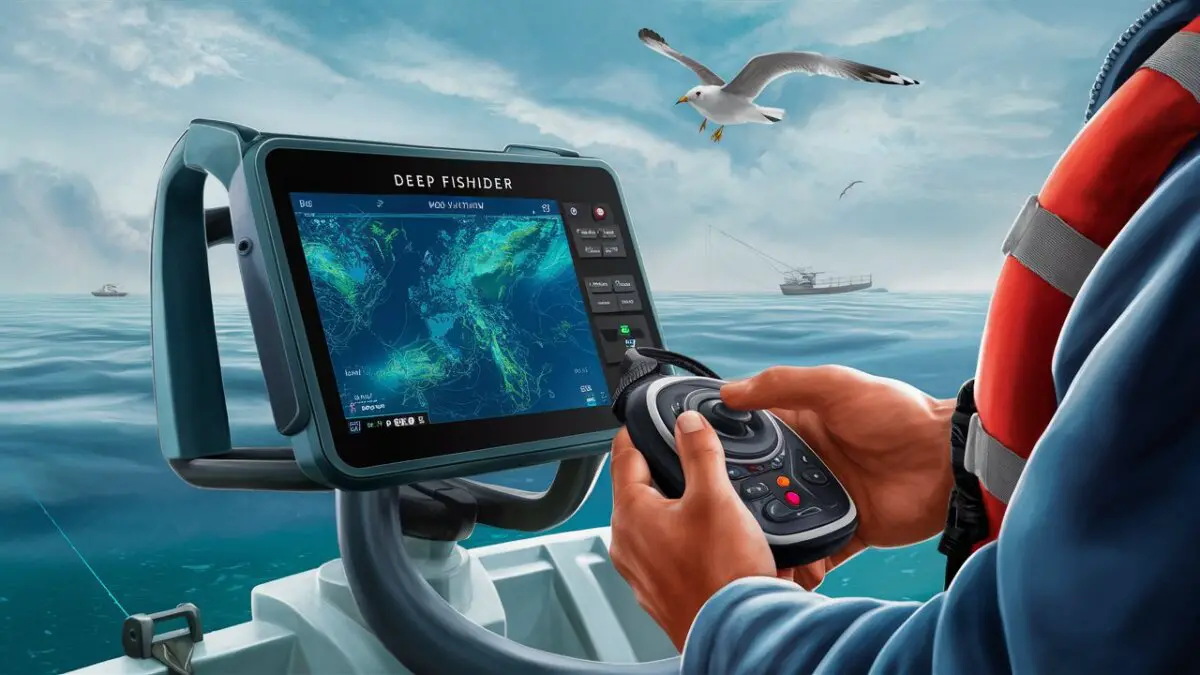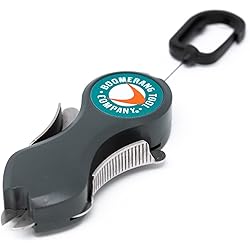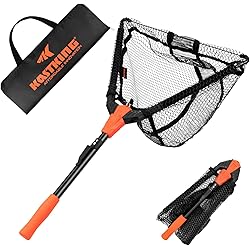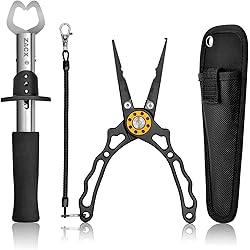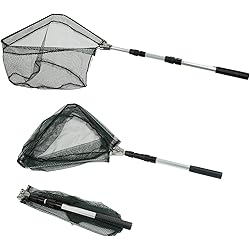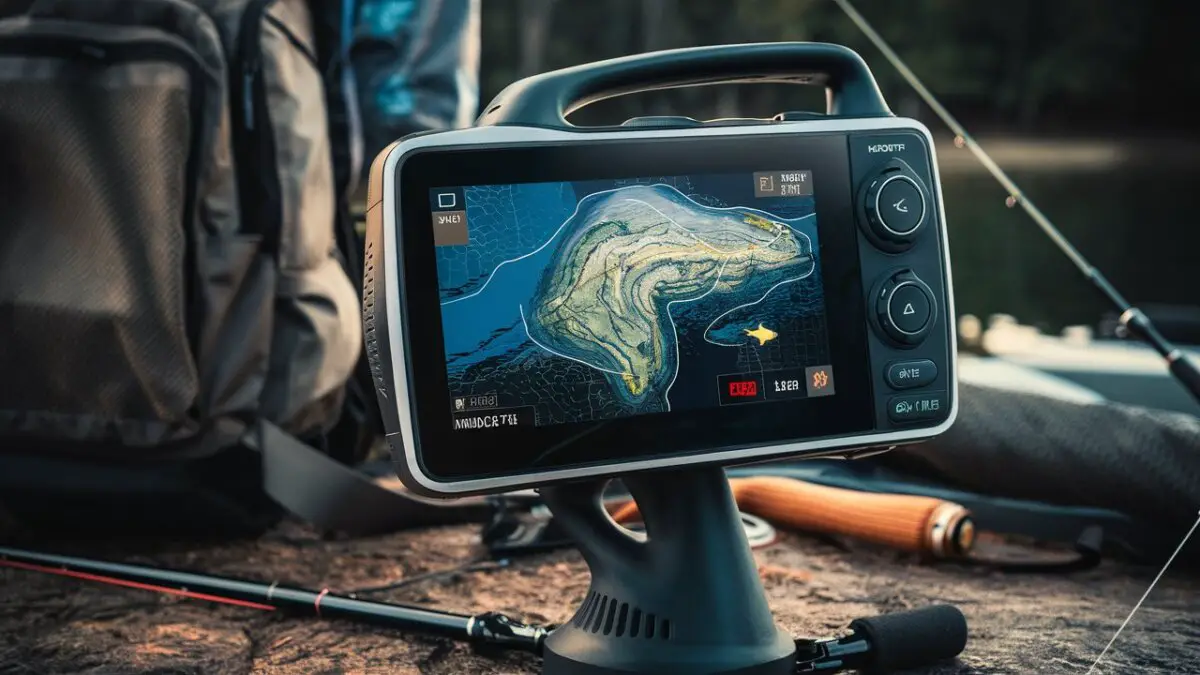Using Deep Fishfinder: A Comprehensive Guide, Thanks to technological improvements, the fishing industry has experienced a radical transformation. Leading this transition is the deep fishfinder.
This advanced gadget has been a game-changer for fishermen looking to maximize their fishing experiences.
In this extensive book, we explore the nuances of making the most of a deep fishfinder, solving the enigmas beneath the surface of the water, and offering priceless tips to improve your fishing skills.
The deep fishfinder brings a level of accuracy and efficiency to fishing that was previously unthinkable, ending the days of relying solely on instinct and conventional techniques.
This technology’s subtleties can improve your lake performance regardless of your angler experience or first line throw.
Bullet Points
- Understanding Deep Fishfinders
- Choosing the Right Deep Fishfinder
- Installation and Setup
- Interpreting Sonar Readings
- Tips for Effective Deep Fishing
- Maintaining Your Deep Fishfinder
- Advanced Features and Technologies
- Deep Fishfinder Accessories
- Real-Life Success Stories
- Comparisons with Traditional Fishing Methods
- Environmental Considerations
- Common Misconceptions About Deep Fishfinders
- Future Trends in Fishfinding Technology
- Conclusion
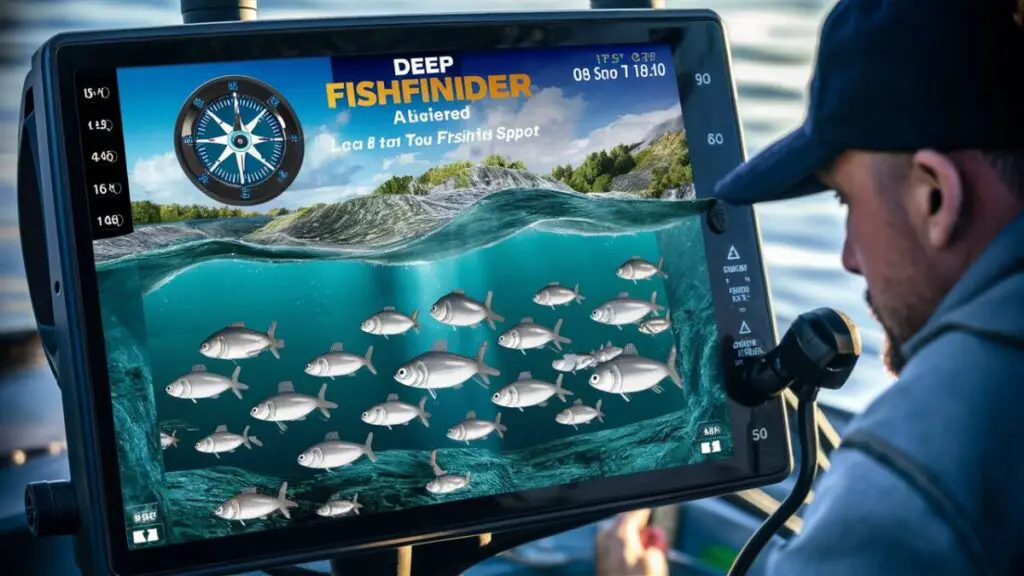
Knowing How to Use Deep Fishfinders
Gaining an understanding of the complexities of sonar technology is essential to deciphering the secrets that lie under the surface of the ocean when it comes to deep-sea fishfinders.
These cutting-edge gadgets use sonar waves to pass through the water, piercing its depths and reflecting off nearby objects.
Next, we carefully decipher the echoes to produce a thorough visual representation on the device’s screen.
Anglers and lovers of the sea can recognize fish schools, seabed topography, and underwater structures thanks to this real-time photography.
To use deep-sea fishfinders to their full potential, one must master the skill of interpreting these sonar-generated images.
By identifying the distinctive patterns that correspond to different underwater features, users may locate possible fishing hotspots with accuracy.
Furthermore, by being aware of the subtleties of sonar technology, people may distinguish between various fish species using their distinctive signatures, which improves the whole fishing experience.

Choosing the Right Deep Fishfinder
For fishermen who want to fish with accuracy and efficiency, choosing the right deep fishfinder is essential.
With so many alternatives available, choosing wisely guarantees a more productive and pleasurable day on the water.
When selecting a deep fishfinder, take into account the fishing environment and frequency of usage.
A multipurpose model that can operate on two frequencies would be perfect for serious anglers who frequently fish in both freshwater and saltwater.
To ensure that the fishfinder can accurately scan the depths you intend to explore, it is also necessary that its depth range coincide with the fishing sites.
Cutting-edge features like side and down imaging, GPS integration, and imaging may greatly improve your fishing experience.
Image technology allows for in-depth views of underwater landscapes and fish structures, while GPS enables precise navigation and the identification of productive areas.

Installation and Setup
Although installing and configuring your deep fishfinder can seem difficult at first, with our detailed step-by-step instructions, you’ll be able to do it with ease.
First, unpack your fishfinder and familiarize yourself with its components. Choose a mounting location that works well for your boat and offers an unobstructed view of the water.
For best sonar performance, attach the transducer to the hull in accordance with the manufacturer’s instructions.
After that, attach the fishfinder’s display unit, making sure all of the wires are firmly in place.
Turn on the device and go through the initial setup, inputting basic data such as depth readings and water temperature units.
Whether you’re fishing in freshwater or saltwater, calibrate the transducer to fit the conditions and change the parameters for optimal precision.
In our guide, we go into detail about customizing sophisticated features, such as frequency and sensitivity settings, for various fishing scenarios.
To ensure that underwater features and fish arches are clearly visible in a variety of lighting situations, make the necessary adjustments to the display settings.
With our simple instructions, you can get your deep fishfinder up and running quickly, allowing you to start using cutting-edge technology to improve your fishing.
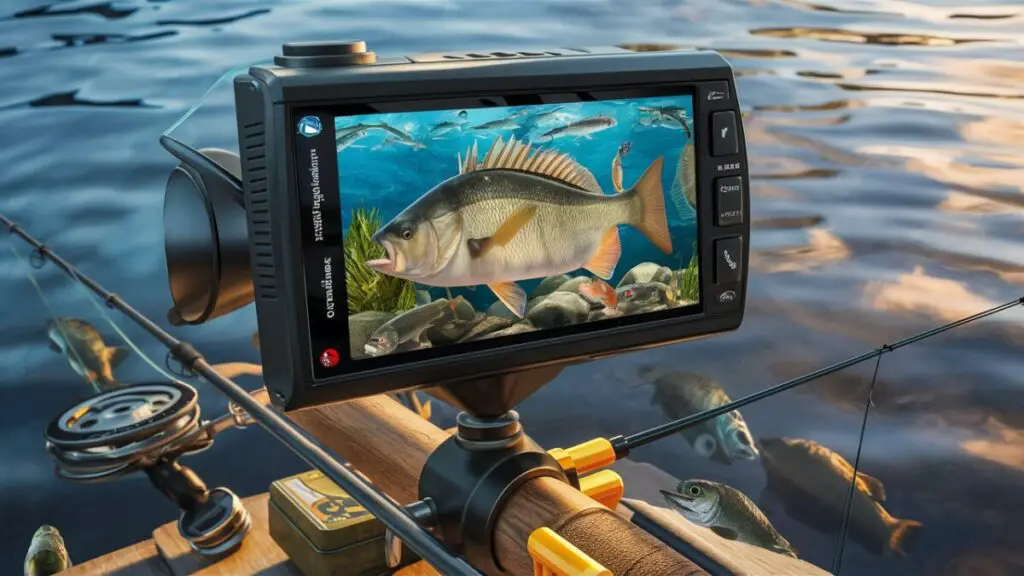
Interpreting Sonar Readings
Your ability to interpret sonar information can greatly increase your success rate when fishing.
Use the information your deep-sea fishfinder provides to understand underwater geography and how to tell fish from buildings.
Your deep fishfinder turns into a window into the underwater environment, offering insightful information that can help you identify between fish and structures and solve the secrets of the watery landscape.
The secret is to decode the sonar signals and interpret them into a picture of the underwater environment.
Fish appear on the sonar screen as distinct echoes, despite their tendency to remain elusive below the water surface.
Anglers can pinpoint possible hotspots by distinguishing between schools of fish and underwater objects and learning the subtleties of these signals.
Sonar information can also help anglers precisely explore undersea terrain.
Fishermen can locate fish by using visible submerged structures, drop-offs, and curves, which indicate possible fish gathering spots.
Having this information is essential for developing winning fishing strategies and increasing the likelihood of a good catch.
Essentially, sonar reading interpretation is more than just technology; it’s a talent that takes fishing from luck to strategy, opening up new opportunities for those who can figure out its mysteries.

Tips for Effective Deep Fishing
Deep-sea fishing requires specialized techniques, and a deep fishfinder is a crucial tool for a successful expedition.
To optimize your deep-sea fishing experience, consider the following tips:
- Understanding Sonar Readings: Familiarize yourself with your fishfinder’s sonar readings. Recognize the different signals indicating fish, structures, and the seabed. This knowledge helps you interpret the underwater environment accurately.
- Temperature and Depth: Pay attention to temperature variations at different depths. Many deep-sea species have specific temperature preferences. Adjust your fishing depth accordingly to target the desired species.
- Use High-Quality Equipment: Invest in a reliable deep fishfinder with advanced features. High-frequency transducers offer clearer images, helping you identify fish and underwater structures with precision.
- Patience and Persistence: Deep-sea fishing demands patience. Fish may be scattered across vast areas, so be persistent and explore different depths and locations. Monitor your fishfinder continuously for signs of activity.
- Bottom Structure Awareness: Identify promising bottom structures like drop-offs, underwater mountains, or reefs. These areas attract diverse marine life, increasing your chances of a successful catch.
- Adjust Sensitivity Settings: Tweak sensitivity settings based on water conditions. Reduce sensitivity in choppy waters to minimize clutter, and increase it in calm conditions to detect subtle movements.
- Regular Software Updates: Keep your fishfinder’s software up-to-date to access the latest features and improvements. Manufacturers often release updates that enhance performance and accuracy.
By combining technological prowess with a deep understanding of the underwater environment, anglers can elevate their deep-sea fishing game and increase the likelihood of a rewarding catch.
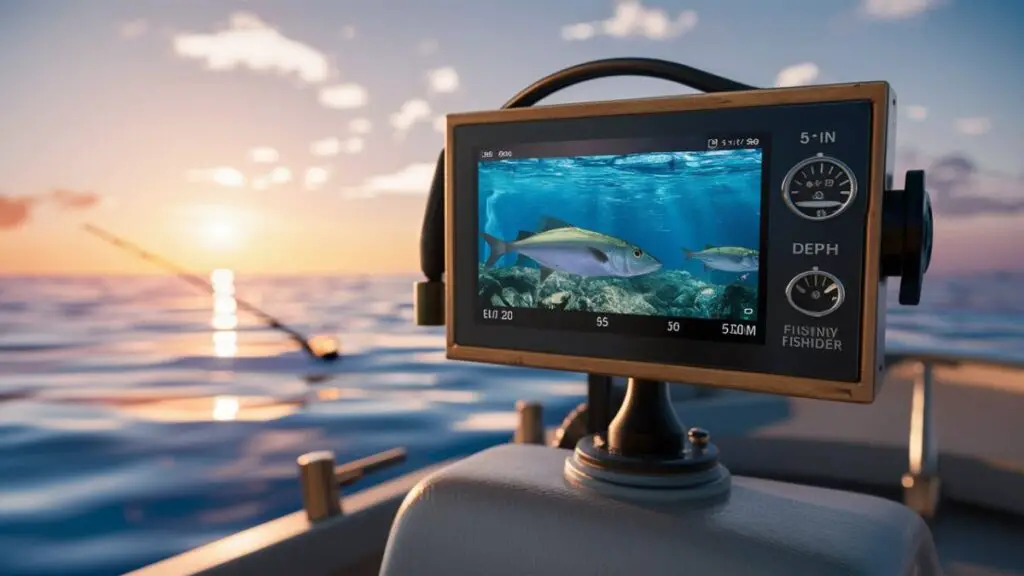
Maintaining Your Deep Fishfinder
To guarantee your deep fishfinder operates at its best and lasts a long time, maintenance is necessary.
Consistent maintenance not only increases the device’s accuracy but also extends its lifespan, enabling you to fish with ease.
Start by examining the transducer, which is the main part of the apparatus that transmits and receives sonar waves.
Thorough cleaning is necessary to remove any dirt or marine vegetation that could reduce its usefulness.
Next, check the connections and wiring for any signs of corrosion or wear. Ensure the firm attachment of each wire to prevent any transmission disruptions.
You should regularly update your fishfinder’s software to take advantage of the newest features and enhancements.
To keep the display screen clear, wipe away any debris or water stains that can obstruct your vision using a gentle, lint-free cloth.
If the device is in a saltwater environment, clean it with freshwater after every use to avoid salt accumulation, which can damage delicate parts.
When not in use, keep your fishfinder in a cool, dry location to shield it from harsh weather and any damage.
By following these maintenance procedures, you’ll be able to prolong the useful life of your deep fishfinder and enhance your fishing experience overall.
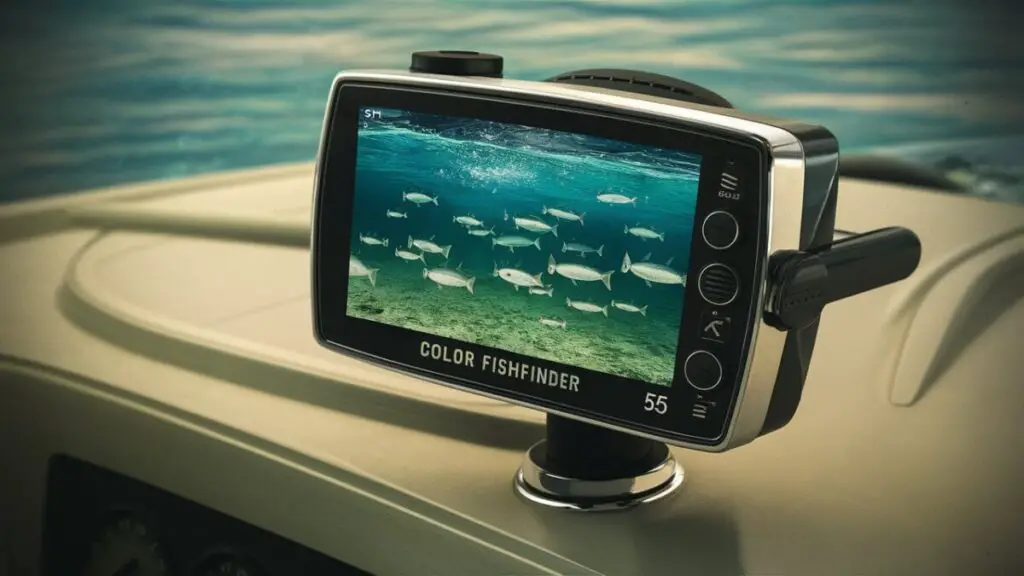
Advanced Features and Technologies
Deep-sea fishfinders, with their various cutting-edge features and technology, are revolutionizing fishing.
Target separation and clarity are unequaled by modern sonar systems, including the CHIRP (Compressed High-Intensity Radiated Pulse) system.
This technique provides a more accurate and realistic picture of the underwater environment by enabling the remarkable clarity of individual fish and underwater structures.
GPS integration is another crucial element that helps anglers easily mark and navigate to predefined waypoints.
Real-time mapping features provide a dynamic picture of the underwater environment, enabling users to make swift strategic decisions.
Some fishfinders even come equipped with artificial intelligence algorithms that learn and adjust to the user’s preferred fishing methods over time, increasing the device’s predictive capabilities.
Thanks to wireless connectivity, anglers may monitor their fishfinder remotely and get data from several devices. Additionally, wireless connectivity allows for smooth integration of smartphones and tablets with the device.
Moreover, augmented reality displays superimpose important information on the angler’s field of view, making for a state-of-the-art and intuitive fishing experience.
These advancements in deep fishfinder technology, the product of a marriage of fishing expertise and technical prowess, have completely redrawn the bounds of what is possible under the water’s surface.

Deep Fishfinder Accessories
Deep Fishfinder Accessories is a state-of-the-art line of fishing equipment that can help you become a better angler.
Utilize your fishfinder’s full potential by adding cutting-edge accessories that ensure accuracy and effectiveness in the water.
With top-notch transducer mounts, you can dive below and get the best positioning possible for precise sonar readings.
Wide-beam transducers allow you to maximize coverage while revealing elusive creatures and hidden underwater structures.
Additionally, Deep Fishfinder Accessories offer a variety of mounting options that are simple to incorporate into various watercraft types.
Modern display mounts, which offer quick access to your fishfinder’s data and excellent visibility, let you stay informed and connected.
How to Use Deep Fishfinder
More sophisticated signal processing modules improve target separation, so you can easily tell the difference between trophy captures and baitfish.
Equipped with robust and dependable equipment that can survive the hardships of any fishing adventure, explore the underwater world with confidence.
Deep Fishfinder Accessories are your reliable allies for discovering the mysteries hidden under the surface, regardless of your level of experience as an angler or your level of familiarity with the deep.
With the ideal fusion of ingenuity and technology, you may improve your fishing technique and get rewards.
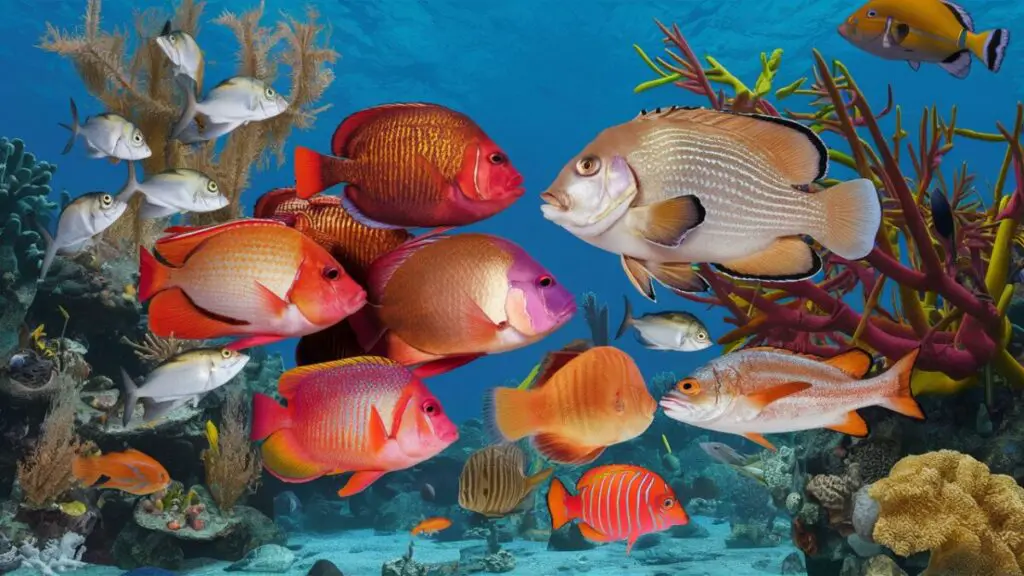
Real-Life Success Stories
Global fishing fans have seen a revolution thanks to Deep Fishfinder, which continuously produces real-life success stories that highlight its efficacy.
Anglers have credited this state-of-the-art equipment for their successes, reporting previously unheard-of catches and increased efficiency.
Mark Thompson, an enthusiastic angler, talked about his use of the Deep Fishfinder at a weekend competition.
He was able to locate an elusive school of trophy-sized bass hidden in deep waters because of its sophisticated sonar capabilities.
Thompson was able to win first place and gain respect from his colleagues because of his astute strategic judgment, which was informed by the device’s precise data.
In another case, recreational angler Sarah Rodriguez was astounded by Deep Fishfinder’s user-friendly design.
She relied on the device’s mapping functions to find the best fishing areas with ease while navigating unknown seas.
Rodriguez’s increased self-assurance resulted in an amazing voyage with plenty of catches and beautiful scenery.
These Deep Fishfinder success tales spread throughout various fishing circles, creating a sense of solidarity among fishermen who value the device’s ability to turn their fishing misadventures into victorious expeditions.

Comparisons with Traditional Fishing Methods
By altering conventional approaches, deep fishfinders have brought about a revolutionary change in fishing.
In contrast to traditional methods that depend on experience and intuition, deep fishfinders use state-of-the-art technology to deliver data in real time about the locations of fish, underwater topography, and water conditions.
With this cutting-edge equipment, anglers may better comprehend the aquatic environment and maximize catch rates by making well-informed judgments.
Using deep fishfinders greatly reduces the amount of guesswork involved in finding fish compared to more antiquated techniques like trolling or casting without technology.
These gadgets make use of sonar technology to provide intricate pictures of the underwater environment, which aids fishermen in determining the best locations to throw their lines.
Furthermore, by showing anglers the depth and movement patterns of fish schools, deep fishfinders enable them to customize their approach and bait choices, raising the possibility of a capture.
Deep fishfinders bridge the gap between the ancient art of fishing and the digital era by bringing data-driven accuracy to angling, whereas conventional fishing methods rely on experience and intuition.
The convergence of tradition and innovation in the quest for piscatorial success becomes a distinguishing characteristic of modern fishing techniques as fishermen use these technological aids to a greater extent.
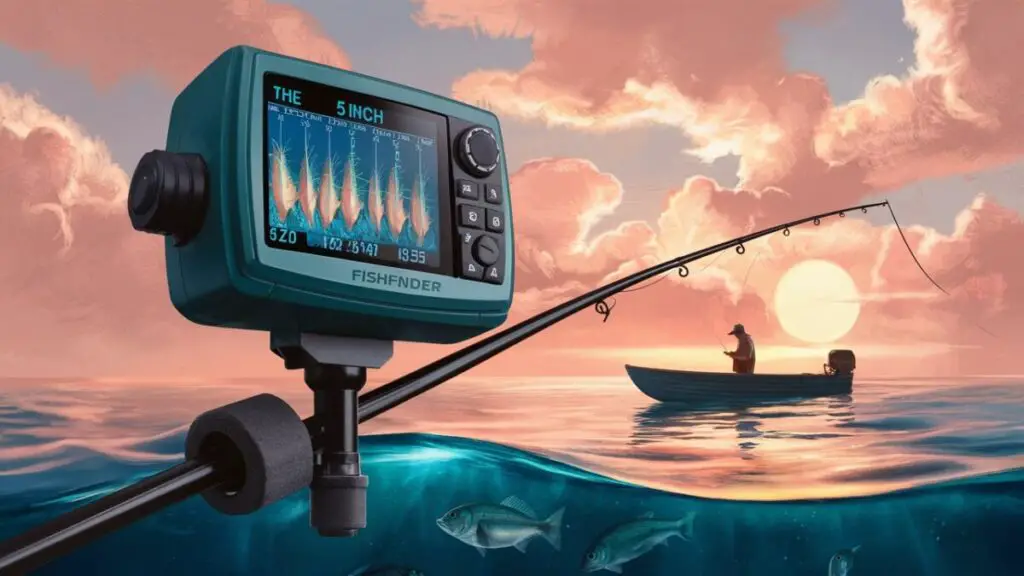
Environmental Considerations
Examining the environmental implications of deep fishfinder technology is essential when exploring this cutting-edge fishing instrument.
By using deep fishfinders, fishermen may detect and target fish more successfully by transmitting sonar signals down into the depths. However, this technology comes with new environmental obligations.
One important thing to think about is how it can affect marine life.
Sonar signal transmission has the potential to upset aquatic ecosystems and, in some situations, stress or disorient marine life.
It becomes crucial to strike a compromise between the advantages of deep-sea fishfinders and reducing their ecological imprint.
In order to minimize any negative consequences, manufacturers and users must emphasize sustainable practices and follow regulations.
Deploying deep-sea fishfinders must also coincide with conservation initiatives.
Understanding and respecting protected areas, migratory paths, and limited areas is crucial to ensure responsible use of the instrument.
A comprehensive approach to environmental management includes encouraging appropriate disposal practices for outdated electronics and using eco-friendly materials in production operations.
In essence, as fishermen accept the advantages of deep fishfinders, they face a shared obligation to conserve and safeguard sensitive underwater habitats.
Striking a balance between environmental stewardship and technical innovation enables us to maintain the health of our seas while preserving the benefits of these instruments.

Common Misconceptions About Deep Fishfinders
One of the most prevalent myths regarding deep fishfinders is that they can ensure immediate success when fishing.
Many fishermen make the mistake of thinking that having a high-tech fishfinder makes it easier to detect and catch fish in deep water.
These gadgets are instruments, but they rely on expertise and interpretation.
Another myth is that deeper waters are often home to bigger fish.
The size and type of fish still depend on variables including the underwater habitat, season, and local fish population, even though deep fishfinders may undoubtedly assist in identifying fish at different depths.
It’s also a common misconception that pricy fishfinders always work better.
Although more expensive models frequently have more sophisticated capabilities, how well they work depends on how well the user knows the gadget and the underwater habitat.
Furthermore, some people believe that fishfinders replace the necessity for conventional fishing expertise.
In fact, fishing well necessitates a combination of expertise and technology.
Finally, there’s a myth that fishfinders are impeccably accurate at locating fish.
Variables like vegetation and water temperature can influence the subjective findings of these instruments, despite their ability to yield insightful data.
Anglers may improve their overall fishing experience by utilizing deep fishfinders more wisely and becoming aware of these common fallacies.

Future Trends in Fishfinding Technology
We anticipate exciting developments in fish-finding technology in the future, which will completely change how fishermen discover and capture fish.
Integrating artificial intelligence (AI) and machine learning algorithms into fishfinders is a significant development. This allows fishfinders to analyze enormous volumes of data and deliver more precise and up-to-date information on underwater topography and fish behavior.
Furthermore, there is an increasing focus on creating smaller, smarter gadgets.
Fishermen may now carry sophisticated fishfinding capabilities in their pockets because of the increasing emphasis on miniaturization and improved mobility.
Another new trend is wireless connectivity, which makes it possible for fishfinders and other gadgets—like smartphones or smartwatches—to communicate seamlessly.
Furthermore, improvements in image technology, such as 3D and augmented reality displays with high resolution, should provide fishermen with a more realistic and immersive perspective of underwater environments.
By reducing bycatch and unintentional environmental effects, these technologies will improve fishing while also supporting sustainable fishing methods.
Future fishfinding technology promises to make fishing more accessible, pleasurable, and ecologically conscious as long as the fishing industry continues to embrace innovation.

Conclusion
Finally, deep-sea fishfinders became essential tools for modern fishermen.
Gaining proficiency with these state-of-the-art implements enables people to improve their fishing trips and greatly increase their chances of success in the sea.
Deep-sea fishfinders are more than just fishfinders; they are multifunctional devices.
These tools provide crucial insights into the underwater topography by pointing out features and structures that make for excellent fishing locations.
Anglers can maximize their catch by carefully positioning themselves for the best outcomes and analyzing the data presented on the fishfinder screen.
Furthermore, fishfinders’ real-time information guarantees that fishermen remain flexible and sensitive to changing water conditions.
By grasping the subtleties of deciphering sonar signals and modifying settings, fishermen can differentiate between different fish species and their corresponding behaviors, thereby optimizing their method.
Deep-sea fishfinders are really revolutionary instruments that unite angler intuition with underwater reality, transcending technological advancements in and of themselves.
Equipped with this understanding, fishermen may confidently traverse the wide oceanic stretches, opening up a world of opportunities and achieving success in their fishing endeavors.
FAQs (Frequently Asked Questions)
Is a deep fishfinder suitable for all types of fishing?
Deep fishfinders are versatile and can be used for various fishing styles, from freshwater to deep-sea fishing.
Do I need technical expertise to install a deep fishfinder?
While basic knowledge is helpful, most deep fishfinders come with user-friendly installation guides.
Can I use a deep fishfinder in any weather conditions?
Most deep fishfinders are designed to withstand different weather conditions, but it’s essential to check the specifications of your specific model.
Are there any regulations regarding the use of fishfinders in certain areas?
Some areas may have regulations on fishfinder usage, so it’s crucial to be aware of local fishing laws.
What should I do if my deep fishfinder malfunctions?
Refer to the troubleshooting section in your user manual or seek assistance from the manufacturer’s customer support.
Hooked on Tech: Exploring the latest Fishing Gadgets that Anglers swear by.
In the realm of angling, where tradition and technology often converge, a new wave of fishing gadgets has emerged, transforming the way anglers approach their craft.
From advanced fish finders to smart bait systems, these innovations have not only revolutionized the fishing experience but have also garnered a loyal following among anglers worldwide.

